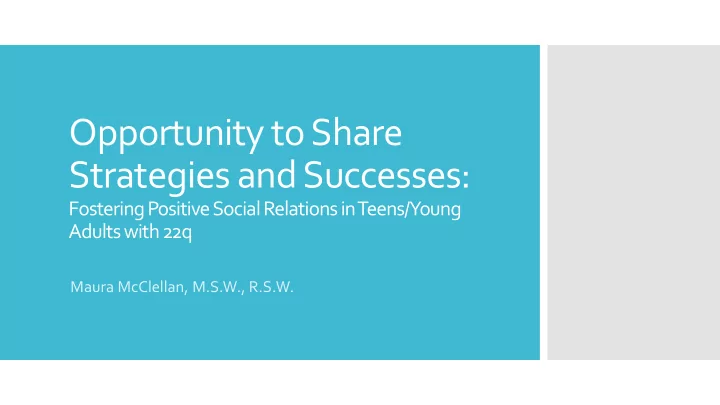

Opportunity to Share Strategies and Successes: Fostering Positive Social Relations in Teens/Young Adults with 22q Maura McClellan, M.S.W., R.S.W.
Developmental Tasks of Adolescence The Teen Brain Overview Parenting Teens/Young Adults Breakout Groups Discussion/Wrap-up
Achieving new and more mature relations with their peer group (dating!) Achieving emotional independence from parents and other adults Developmental Acquiring a set of values and an ethical system Tasks of to guide behavior — developing an ideology Adolescence and identity separate from family Body Image – can become preoccupied with looks/weight; exploring and understanding their sexuality
Some of these developmental tasks may be more challenging for teens/young adults with Developmental 22q: Tasks of Achieving new and more mature relations Adolescence with peer group (dating!)
Healthy relationships involve two people who: Care about each other. Understand and respect each other and are Developmental responsible for each other. Tasks of Solve problems together and communicate Adolescence with honesty. Share at least some of the same goals and values.
Destructive/unhealthy relationships involve : Developmental Manipulation and jealousy. Tasks of Negative attitudes and dishonesty. Adolescence Blaming each other for their problems.
Some of these developmental tasks may be more challenging for teens/young adults with Developmental 22q: Tasks of Achieving emotional independence from parents Adolescence and other adults
Assess your teen’s readiness Developmental Can your teen keep track of time? Tasks of How does your teen behave in emergencies? Adolescence How impulsive is your teen?
Teen Brain
Teen Brain
Understanding the Teen Brain There are essentially two brains at work in a teenager/young adult, the emotional brain and the Teen Brain rational brain The emotional brain is excited by taking risks and seeking thrilling experiences
How can you help? Provide guidance, opportunities, and environments that promote the development of the rational or Teen Brain “thinking” brain Avoid conflict and stay calm Focus on important issues of health and safety
Parenting Teens/Young Adults
Parenting Teens/Young Adults
Parenting Goals Parenting Maintain a positive parent /teen relationship Teens/Young Prepare teen for self-reliant independent living Adults
Validate their emotions…. Create safety to make mistakes and talk to you Parenting about it Teens/Young Less advice giving and more shared problem Adults solving Stand on the same side of problem...avoid putting problem between you and your child
Enabling Empowering Waking teens in the morning, Listening and giving doing their laundry, picking emotional support and out their clothes Parenting validation without fixing or Typing papers, delivering discounting Teens/Young forgotten homework to Teaching life skills school Adults Feeling sorry for teens, Letting go (without excusing them from helping abandoning) the family with household Sharing what you think, how chores you feel and what you want Giving them everything they without lecturing, insisting want “because everyone has on agreement one”
Sharing Strategies and Successes
1.Online World 2.School Community Sharing 3.Peer Friendships Strategies and 4.Dating Relationships Successes 5.Social and Health Services 6.Employment/Volunteer Community
How do we build up a network of people we trust who understand my child’s support needs? Where are places in our community that my child can be included and start to have relationships with people outside of our family? Discussion What are the risks of not engaging socially and the risks of engaging socially for our children in different settings? What can we do to help make social situations more supportive, accessible and inclusive?
Secure Attachment
Recommend
More recommend